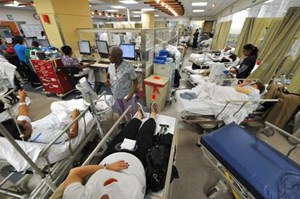UPDATE: April 2, 2025
Emergency physician-led changes to the 2025 Leapfrog Hospital Survey are in effect and will push hospitals toward more transparent and actionable reporting on the boarding crisis.
Three new measures seek:
- The percentage of ED patients that are admitted to the hospital that had a boarding time in the ED of more than 4 hours (where lower percentages are desirable)
- The median length of stay in the ED for patients admitted to the hospital (where lower values are desirable)
- The 90th percentile length of stay in the ED for patients admitted to the hospital (where lower values are desirable)
Based on ACEP's comments, additional changes include:
- To recognize the systemic nature of this crisis, Leapfrog will rename the subsection “Hospital Boarding in the Emergency Department (ED)” instead of “ED Boarding.”
- Leapfrog will include patients admitted to observation status, as well as those admitted to the hospital’s inpatient setting.
- Hospitals will be asked to separate adults from pediatric patients, and those admitted to inpatient psychiatric beds from non-psychiatric beds. The goal of the latter is to inform whether there could be opportunities to improve the approach to patients with behavioral health emergencies.
For now, these measures are optional and not publicly reported for 2025. But, Leapfrog has indicated intent to publicly report in the future to “shine a light on the current crisis and its associated patient safety risks.”
ACEP, chapters and members are working at every level to tackle the boarding crisis. Together, we can enhance transparency, improve data sharing and move everyone closer to systemwide solutions that improve care and make it easier for you to save lives.
UPDATE: January 15, 2025
Connecticut ACEP Leads Efforts to Boost Hospital Transparency Around Boarding Crisis
With the state legislative session now underway, ACEP members are leading the call for changes to alleviate the boarding crisis. Read the report prepared for legislators by Dr. Christopher Moore and the committee of physicians.
November 22, 2024
ACEP members are tackling the boarding crisis from every angle. A multi-year effort by Connecticut ACEP to work with the Leapfrog Group, a national nonprofit health care watchdog organization, could markedly increase the amount of hospital data available on boarding.
Connecticut ACEP advocacy has led to a proposed update to Leapfrog’s annual hospital survey that could include “fact-finding questions to assess boarding times for patients seen in the emergency department,” the organization announced.
ACEP’s comments on the Leapfrog Group's proposed changes to their 2025 Hospital Survey are now available and include measure specifications, optionality of measure reporting, and potential enhancements of data collection and reporting.
| Would you like to see more transparency from hospitals? Chime in! Leapfrog will accept public comments until December 13, and anyone is welcome to provide input that may be used to refine data collection. |
With about 80% of the nation’s hospitals participating in the annual Leapfrog survey, the results are widely read by policymakers and health leaders. The addition of boarding data could have a significant impact on hospital practices.
“If it’s a priority, it can be done,” said Christopher L. Moore, MD, a Connecticut ACEP member leading the efforts with Leapfrog. “We know that boarding is a solvable problem if it is given sufficient attention as a patient safety issue.”
Dr. Moore believes that nobody should have to settle for a status quo that compromises quality of care and that state level initiatives can lead to measurable change.
“There are untapped opportunities at the state level for emergency physicians to get involved,” Dr. Moore said. “These efforts have the potential to bring about public accountability and transparency and to look towards solutions.”
Connecticut ACEP members are prominent among those leading the way on boarding solutions.
Dr. Moore is also the co-chair of a state government workgroup that advocated for new reporting requirements on boarding by Connecticut hospitals. The workgroup will submit a final report to the state on emergency department boarding and crowding, including proposed solutions, by January 2025. State-level initiatives can be complementary to national initiatives such as the Emergency Care Capacity and Quality (ECCQ) measure which is being considered by the Centers for Medicare and Medicaid Services (CMS).
Emergency physicians are increasingly finding that progress on seemingly intractable challenges is possible through collaboration with their state chapters and national committees.
ACEP’s comprehensive efforts to address the root causes of boarding include alerting the White House, sounding the alarm through hundreds of troubling stories and tying boarding-related attestations to hospital performance measures. In October, ACEP advocacy led to a stakeholder summit convened by the Agency for Healthcare Research and Quality.
ACEP is proud to support emergency physician-led initiatives that get everyone a step closer to ending the boarding crisis.
Related:
Boarding Patients in Emergency Departments Nearly Doubles Daily Cost of Care, Study Finds





